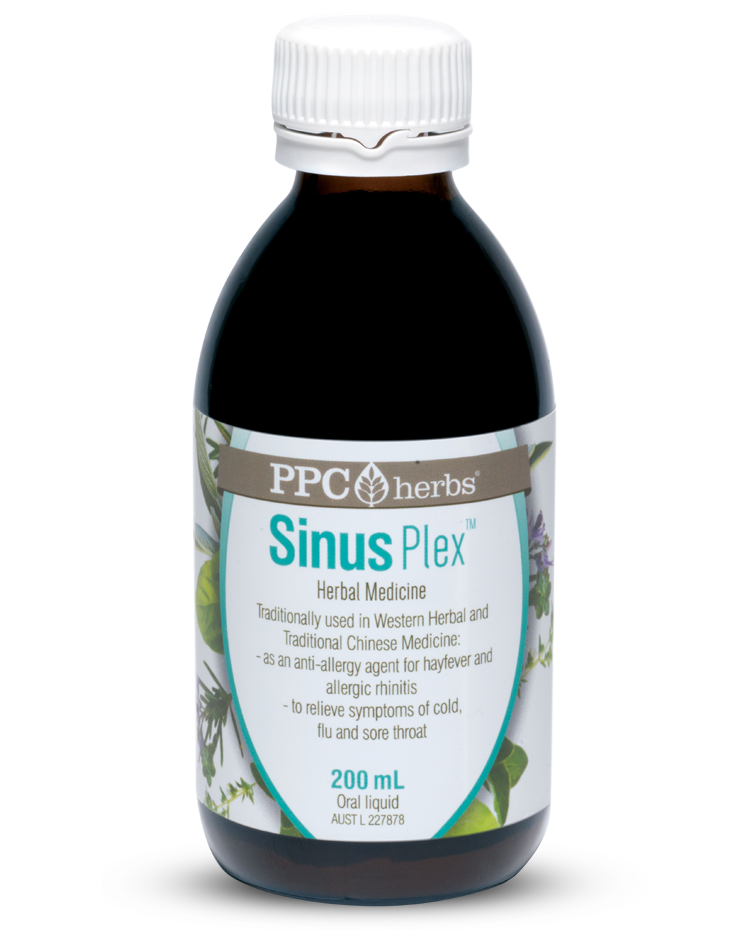Sinus Plex® is one of PPC Herbs’ range of listed herbal medicines. As liquid herbal solutions, each member of the Plex® family are suitable for the whole family to assist in the management of several different medical conditions.
PPC Herbs’ Herbal Medicines are Australian Made and developed by Herbalists and Naturopaths for health-conscious Australian consumers who want to manage their own health conditions naturally. Made from genuine botanical materials with no added sugars, no animal testing, vegan friendly and gluten free; Plex® medicines are ideal options for day to day health needs.

Sinus Plex ® Traditionally used in Western Herbal and Traditional Chinese medicine:
- to relieve symptoms of hay fever, allergic rhinitis, and sinusitis
- as a decongestant and expectorant
- to soothe irritated tissues
- to relieve symptoms of common colds and flu
Plex® Herbal Medicines are oral liquids. Scientific studies have demonstrated that liquids, as opposed to tablets or capsules, have faster absorption rates, higher optimisation rates and more easily digestible. Liquid remedies or medicines have a dosing flexibility where the daily dose can be diluted with water, juice or taken straight from the bottle.
Sinus Plex ® Contains the following botanical Ingredients:
Eyebright herb (dry), Euphrasia officinalis
Eyebright has several chemical components that make it very useful medicinally; tannins, vitamins A, B, C, D and E, phenolic acids, volatile oils, essential oils, bitters, flavonoids and iridoid glycosides. These chemical components give it astringent, antioxidant, antibiotic, and anti-inflammatory properties.
The main use of Euphrasia, as suggested in the common name eyebright is as a remedy for all manner of eye problems (except when lens and surgical correction is required). It is of extreme benefit to all allergic reactions that could affect the eyes, fighting free radicals that could damage the eyes. It also has the effect of tightening the mucous membranes around the eyes. In light of this, eyebright has especially been helpful to people suffering from blepharitis, conjunctivitis and related disorders.
The astringent properties of Euphrasia aid in reduction of the excessive mucus that are associated with cold seasons and flu, sinusitis, respiratory problems in the upper region and problems with the inner ear.
Baical Skullcap root (dry), Scutellaria baicalensis
Baikal Skullcap is a Chinese medicinal herb that is a member of the mint family and is rich in nutrients. The nutrients in this plant are beneficial for reducing oxidative stress in the tissues in your body and has been used for over 2,000 years to treat fevers, hypertension, coughing, and other ailments; It is still used today as a traditional remedy for dysentery and diarrhea.
Baikal skullcap is recommended for fever, cough, GI, and urinary problems, and is also used in Chinese herbal medicine for inflammation, allergies, dermatitis, hyperlipidaemia, and atherosclerosis.
Liquorice root (dry), Glycyrrhiza glabra
Liquorice root, botanically classified as Glycyrrhiza glabra, is the underground stolon of an herbaceous, fern-like plant that belongs to the Fabaceae or legume family. Also known as Sweet Root, Gan Zoa in Chinese, Liquorice in British English, and Sweetwort, the name Liquorice comes from the French word ‘licoresse’ and the ancient Greek word ‘glukurrhiza’ both meaning “sweet root.” Liquorice root is predominately harvested when the plants have reached 3-4 years in age, and the roots are then dried. Liquorice root has been used as a medicinal ingredient for thousands of years in natural medicines.
There are more than 300 different compounds in liquorice, some of which have antiviral and antimicrobial properties. Among other ailments, it is traditionally used for upper respiratory infections such as coughs, asthma, and sore throats
Elder flower (dry), Sambucus nigra
As Elder flowers are high in flavonoids (especially rutin and isoquercitrin) they have long been used in natural medicine as healing remedies particularly for the upper respiratory tract and sinuses. Elder flower is also used in Chinese medicine, for treating joint pain and inflammation.
Elder flower has an anti-inflammatory effect, meaning it soothes inflamed tissues in the sinuses and dries up secretions and excess mucus. This makes it a great remedy for sinusitis, colds and allergies. It encourages perspiration, therefore helping the body’s natural immune response to work more effectively.
Garlic bulb (fresh), Allium sativum
Garlic is a surprisingly good source of vitamins C, B6 and the minerals selenium and manganese – all of which boost the immune system and may reduce the frequency of upper respiratory infections.
Garlic bulb’s antioxidant and antimicrobial properties strengthen the body’s defence mechanism and fight infection, which makes it effective in treating cough and cold. It may also reduce the severity of upper respiratory infections.
Garlic is highly beneficial in treating various respiratory conditions such as asthma and bronchitis. It also promotes expectoration with coughs, making it irreplaceable for those with chronic bronchitis.
It can also enhance mineral absorption.
References
https://www.healthbenefitstimes.com/
http://www.handmadeapothecary.co.uk/
Complementary therapies require appropriate guidance from health care professionals. Persistent symptoms or a worsening of any condition should be discussed with your health care provider immediately.